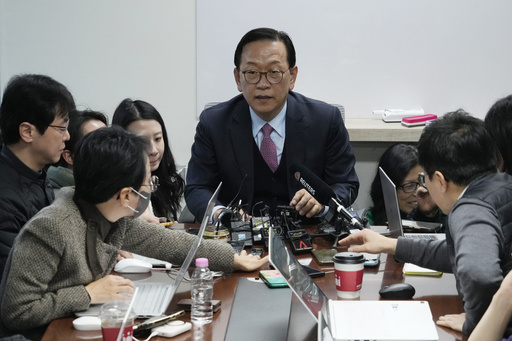
SEOUL, South Korea — The acting head of South Korea’s government has rejected a number of controversial bills put forth by the major opposition party, exacerbating the ongoing political turmoil following the National Assembly’s impeachment of President Yoon Suk Yeol.
The conflict between the ruling party and the opposition has intensified surrounding the extent of authority Prime Minister Han Duck-soo has taken on since the National Assembly, now under opposition control, voted last Saturday to suspend Yoon’s presidential powers. This action stemmed from Yoon’s brief declaration of martial law on December 3. The nation’s Constitutional Court is tasked with deciding whether to officially remove Yoon from office or to restore his authority.
In a related investigation, law enforcement is examining whether Yoon’s implementation of martial law constitutes rebellion. Several high-ranking officials, including Yoon’s defense minister and police chief, along with other military leaders, have already faced arrest as a result of the unfolding situation. Earlier, the main liberal opposition party, the Democratic Party, contemplated the possibility of impeaching Han for his inaction regarding Yoon’s martial law announcement but later opted against this after Han was named acting leader.
Of the six bills vetoed by Han, four were focused on enhancing financial aid for the agriculture and fisheries sectors. The most significant of these bills is the Grain Management Act, which mandates government purchases of excess rice in instances of significant price drops aimed at safeguarding the agricultural industry and promoting food sovereignty. Han expressed concerns that the enactment of this bill would place a substantial financial strain on the government and could potentially lead to even lower rice prices.
Another contentious piece of legislation is the National Assembly Testimony Appraisal Act, which would expand lawmakers’ authority to summon individuals to parliamentary hearings and require them to provide documents. According to the proposed law, individuals could not refuse such requests by citing trade secret protections or personal data privacy. The Democratic Party has argued that the bill is essential in uncovering the complete details surrounding Yoon’s martial law declaration; however, Han contended that it would likely infringe upon personal privacy and raise alarms among business leaders regarding the risk of disclosing sensitive information.
“I regret having to ask the National Assembly to revisit these six bills at a crucial time when inter-party cooperation is essential,” Han stated during a Cabinet Council meeting, emphasizing the importance of adhering to the Constitution and prioritizing the nation’s future.
In response, Democratic Party lawmaker Noh Jongmyun quickly criticized Han’s actions, cautioning him against overstepping boundaries and warning that they would act decisively if he is found to have conspired with any rebellious efforts.
Following the vetoes, Han’s office formally communicated these decisions to the National Assembly. For a president’s vetoed bill to pass, support from two-thirds of the Assembly’s 300 members is required. Currently, the Democratic Party and other small opposition groups hold 192 seats among them.
Speculation has arisen regarding whether the Democratic Party might reconsider the impeachment of Han if he continues to veto important legislation. Additionally, there remains contention surrounding Han’s authority to appoint three vacant judges to the Constitutional Court, as these appointments could influence the court’s ruling regarding Yoon.
The martial law decree, although only enacted for six hours, instigated considerable political unrest in South Korea and heightened tensions with neighboring countries and diplomatic entities. Yoon’s decision to deploy numerous troops and police to secure the National Assembly against a vote on his decree was met with pushback when lawmakers successfully convened and rejected the martial law. Yoon has defended his actions as a form of governance intended to signal to the Democratic Party, whom he accuses of obstructing his political agenda through their majority in parliament.
In conversations with international media, Seok Dong-hyeon, who is part of Yoon’s newly formed legal team, echoed the president’s stance that his brief imposition of martial law should not be characterized as an act of rebellion. Seok clarified that there was no intent to hinder parliamentary functions and denied allegations that Yoon had ordered military personnel to detain political adversaries, including the Democratic Party’s leader, Lee Jae-myung.
Addressing the rebellion accusations, Seok argued that the public nature of Yoon’s announcement during a press conference contradicted the notion of a clandestine uprising, stating, “When the National Assembly followed established legal protocols to revoke martial law shortly thereafter, we respected that process.”
Seok later mentioned that Yoon might appear before the Constitutional Court to advocate for his case directly. When questioned about Yoon’s willingness to engage with law enforcement regarding requests for questioning and searches of his office, Seok was noncommittal, stating such matters would be managed by Yoon’s legal team, which is in the process of being finalized.
